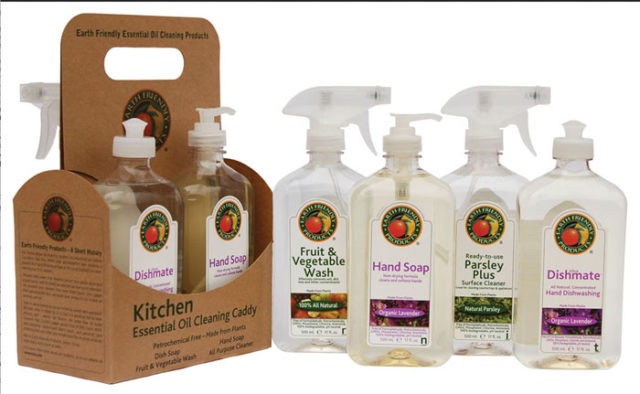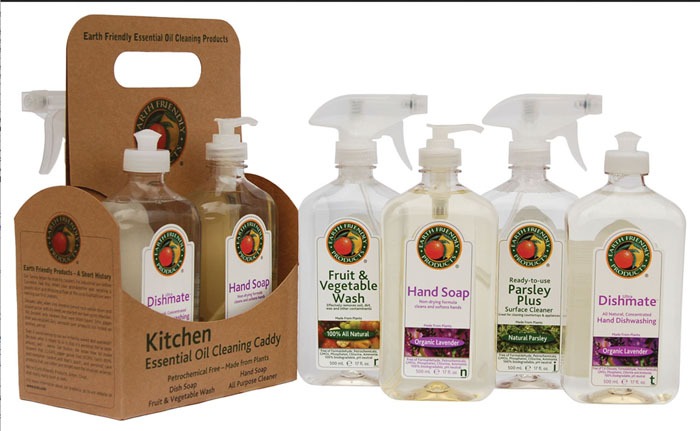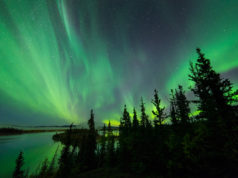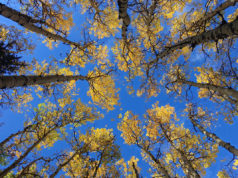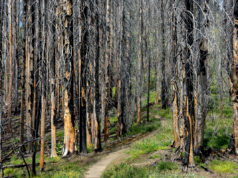Dear EarthTalk: I’m concerned about toxic ingredients in my cleaning supplies, especially now that I have young children. Where can I find safer alternatives?– Betsy E.,
Household cleaning products are responsible for almost 10 percent of all toxic exposures reported to U.S. poison control centers. Fortunately, there are plenty of safer alternatives available, from brands like Ecover, Seventh Generation, Green Shield and Earth Friendly Products, pictured here.
It is true that many household cleaners contain potentially toxic substances, so parents especially should make an effort to keep them out of the reach of children or, better yet, replace them with safer alternatives.
“We use a wide array of scents, soaps, detergents, bleaching agents, softeners, scourers, polishes and specialized cleaners for bathrooms, glass, drains and ovens to keep our homes sparkling and sweet-smelling,” reports the Organic Consumers Association. “But [many] contribute to indoor air pollution, are poisonous if ingested and can be harmful if inhaled or touched.” The group adds that household cleaning products are responsible for almost 10 percent of all toxic exposures reported to
According to the Washington Toxics Coalition, leading offenders include corrosive drain cleaners, oven cleaners and toilet bowl cleaners. Contact with these chemicals can cause severe burns on the eyes and skin and can damage the throat and esophagus if ingested. The chlorine and ammonia contained in some can each cause similar problems, and the hazardous gases unleashed when they combine can be lethal. Other ingredients to avoid for many reasons include diethanolamine (DEA), triethanolamine (TEA), 1,4-dioxane, ethoxylated alcohols, butyl cellosolve (aka ethylene glycol monobutyl ether), and p-nonylphenol.
Meanwhile, the fragrances added to many cleaning products can cause respiratory irritation, headaches and other symptoms in those with chemical sensitivities, allergies or asthma. And since fragrance formulas are considered trade secrets, manufacturers aren’t required to disclose constituent ingredients, leaving even educated consumers in the dark regarding what kind of nasty chemicals they may be spreading around their homes just to, ironically, make their cleaning products smell less chemically.
Fortunately there are plenty of safer alternatives available today, but deciding which ones are truly healthier or just designed to look that way isn’t so easy. That’s where the Environmental Working Group (EWG) comes in. The group’s “Guide to Healthy Cleaning” rates and reviews over 2,100 household cleaning products on the basis of health and environmental safety. EWG lists top products in each cleaning category—from dishwashing and laundry detergents to kitchen and bath cleaning to floor and furniture care—and also offers a “label decoder” that helps consumers learn how to spot trouble on product labels and ingredient lists. Some of the brands that garner high marks from EWG in more than one category include Ecover, Earth Friendly Products, Seventh Generation and Green Shield. Look for these online as well as at Whole Foods or other markets with big selections of healthy or natural products.
EWG also maintains a Hall of Shame where it lists cleaning products that either “greenwash” consumers with misleading label information or contain hazardous ingredients (or are banned abroad but still available in the
CONTACTS: Organic Consumers Association, www.organicconsumers.org ; Washington Toxics Coalition, www.watoxics.org ; EWG’s Guide to Healthy Cleaning, www.ewg.org/guides/cleaners
Credit: Earth Friendly Products
EarthTalk® is written and edited by Roddy Scheer and Doug Moss and is a registered trademark of E – The Environmental Magazine (www.emagazine.com). Send questions to: earthtalk@emagazine.com. Subscribe: www.emagazine.com/subscribe . Free Trial Issue: www.emagazine.com/trial


